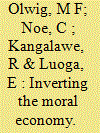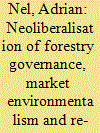| Srl | Item |
| 1 |
ID:
142661


|
|
|
|
|
| Summary/Abstract |
Governments, donors and investors often promote land acquisitions for forest plantations as global climate change mitigation via carbon sequestration. Investors’ forestry thereby becomes part of a global moral economy imaginary. Using examples from Tanzania we critically examine the global moral economy’s narrative foundation, which presents trees as axiomatically ‘green’, ‘idle’ land as waste and economic investments as benefiting the relevant communities. In this way the traditional supposition of the moral economy as invoked by the economic underclass to maintain the basis of their subsistence is inverted and subverted, at a potentially serious cost to the subjects of such land acquisition.
|
|
|
|
|
|
|
|
|
|
|
|
|
|
|
|
| 2 |
ID:
142660


|
|
|
|
|
| Summary/Abstract |
There is often a disjuncture between idealised forestry governance models which posit a ‘win-win for community and environment’ through participatory, multi-stakeholder international development discourses and interventions – and the actually existing processes and structures of natural resource government through which they are articulated. By applying, first, established theorisations of the initial territorialisation of state forestry territory, then conceptualisations of re- and de-territorialisation, derived from Deleuzo-Guattarian formulations, this paper expands on post-structuralist lines of inquiry on the political ecology of forestry to explore substantive transformations in forestry governance in Uganda. It specifically details the role that market environmentalism – the extension of market mechanisms, including carbon forestry, to natural resource governance – plays in reorienting assemblages of actors engaged in forestry governance and in changing configurations of state forestry territory.
|
|
|
|
|
|
|
|
|
|
|
|
|
|
|
|